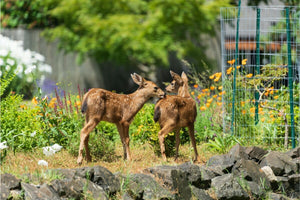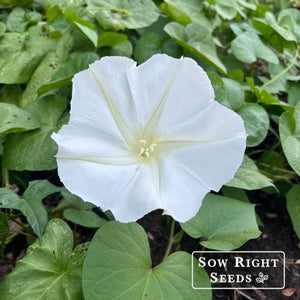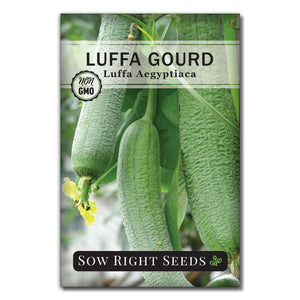How Long Do Seeds Keep? Answers to All Your Seed Storage Questions
Helpful tipsYou saw the amazing flowers your neighbor grew this year and purchased a packet of seeds to grow in your own garden. Now, how long do you have before those seeds go bad? And what’s the best way to save your favorite seeds? We’ve got all the answers to these seed-storing questions and more.

How to Store Seeds
There are incredible stories of viable seeds that are hundreds of years old. According to Guinness World Records, the oldest viable seed to germinate was discovered in the 1960s and planted in 2005. Three seeds were planted, and after eight weeks, one germinated.
So, while it’s possible to have seeds germinate after hundreds of years, optimally, we want our seeds to have a high germination rate for the next planting season.
With the proper storage practices, you can plan your garden, stock up on your favorite new seeds, and ensure they are viable and ready to grow when it’s time to plant.

Seed Storing FAQs
At Sow Right Seeds, we get lots of questions about how to store seeds. We make sure the seeds we sell have a high germination rate. Once your seeds arrive, you’ll want to store them appropriately so they’ll still be fresh and ready to thrive in your home garden.
Store seeds in a cool, dry, dark space.
What exactly does that mean to keep seeds dry and store them in a cool, dark place? This storage recommendation is the opposite of what makes seeds germinate. It is also what keeps them viable so that they will grow.
Dark
Keeping seeds dark is fairly easy. You can store your seeds in their original paper envelopes. This will keep the light out.
Cool
Cool temperature is important to maintain seed viability. High temperatures will speed up the rate of deterioration. The optimal storage temperature for seeds is between 32 and 41ºF. However, to keep your seeds viable for the next planting season, any comfortable space for humans will also be appropriate for keeping seeds. You don’t want to store seeds in a garage or storage shed where temperatures fluctuate and become too hot.
Dry
Keeping seeds dry is the most critical piece. Moisture is what makes seeds germinate. Seeds should be stored in rooms with low humidity. While some basements are cool and dark, they can sometimes be damp, which will affect your seeds unless they are in an airtight container. Consider storing your seeds in a closet or drawer that stays at room temperature with average humidity.

How long are vegetable seed packets good for?
Each vegetable seed is a little different. You may have had experiences with seeds from one year ago that wouldn’t sprout, while seeds that were several years old were just fine. Why is that?
It all has to do with how they were stored and the seed itself. If you start with good-quality seeds, they will have a storage life of at least one year. Some seeds naturally have a short viability time frame, while others last for years.
Some seeds with a short storage life are corn, lettuce, onion, parsley, and parsnip.
Seeds with an intermediate storage life are bean, broccoli, carrot, pea, pepper, and spinach.
Seeds with a naturally long storage life are beet, cabbage, radish, cucumber, pumpkin, squash, tomato, and watermelon.
Whatever kind of vegetable seeds you have, you need to store them properly for the highest germination rates.
Can seed packets be frozen?
Freezing seeds can be a way to preserve them for an extended period of time. Seed vaults like the Svalbard Global Seed Vault in Norway keep their seeds at 0ºF. But they have special equipment and procedures. And a different goal than just having seeds for next year’s garden.
The main concern with freezing seeds is moisture. Any moisture in the seeds will expand when frozen, which can ruin the embryo. You also don’t want fluctuating temperatures. So, if you store seeds in the freezer, don’t take them out and put them back.
Store seed packets in an airtight container and group them with ones that will come out at the same time for planting. Also, store seeds in the back or bottom of a deep freezer so they aren’t subjected to changing temperatures every time the door is opened. When removing seeds from the freezer, let them warm up to room temperature before opening the container.
Can you store seeds in the fridge?
A consistent cool temperature is ideal. Usually, a fridge is kept between 35 and 38ºF, which is great for seeds. However, the concern with storing seeds in the refrigerator is moisture and light. When storing seeds in the fridge, ensure that the seeds are in an airtight container that blocks light. Then, put the container in the back where the temperature will remain consistent. The trick is remembering they’re in there when it’s time to plant! When removing seeds from the fridge, let them warm up to room temperature before opening the container.

What is the best container for storing seeds?
The best container for storing seeds is one that is dry and airtight. Hermetically sealed seeds are going to last the longest. This means that they are airtight and watertight. If your seeds are in a paper packet that blocks the light, you can store seeds in glass jars with an airtight seal. You can also add silica gel packets to ensure the seeds stay dry. An airtight glass container will also keep out mice, weevils, and other pests.

What is a “packed for” date?
The date on the seed packet is not a “use by” or expiration date. The “packed for” date on seed packages refers to the first year they are intended to be planted. This doesn’t mean they won’t be viable past this date; instead, it’s when they were packed for planting. Most seeds will still have high germination rates for a year. The "packed for" date helps you know how long you’ve had those seeds.
Can I save leftover seeds for next year?
Sometimes, you don’t need all the seeds in a packet and would like to save them for the following year. With proper storage, you can preserve your seeds for next year’s garden. Follow the tips for storing seeds in a cool, dry, dark location. Some varieties will naturally last longer than others. You don’t need to keep your seeds for hundreds of years, just until the next growing season.
The “packed for” date will help you know how old the seeds are. You may also want to note when you planted them and how they did. This can help you know if there are any planting adjustments you want to make.

How long do seeds last?
Flower, herb, and vegetable seeds generally last at least a year. Some varieties are considered short-lived, and their viability deteriorates quickly. Others, such as watermelon seeds, can easily last for 3 or 5 years. Storage methods have a significant impact on how long seeds last.
Can seeds expire or go bad?
Garden seeds don’t have an expiration date, but they do lose viability over time. The “packed for” date tells you when they are at their best with the highest germination rate. Seeds can go bad when they are exposed to high temperatures, light, and humidity. Seeds that have gone bad won’t germinate.

How do I check seed viability?
Each year, seeds lose some of their viability. The problem is, you can’t tell just by looking at them. You will need to test them to see if they grow. Germination testing is a simple process you can do at home with seeds you have saved.
To conduct your own germination test, take ten seeds and put them on a damp paper towel. Place the towel in a plastic bag or container that will stay moist. Store it in a warm place for a few days and see if any seeds germinate. Some seeds naturally take longer to germinate, so check the seed packet to see if it is within the expected timeframe.
To find your germination rate, multiply the number of seeds that sprouted by 10. If five of your ten seeds germinated, you have a germination rate of 50%.
The enormous potential of every seed makes it hard to throw any away. That’s why gardeners want to use all the seeds they have. Storing seeds properly will ensure you have viable seeds when it’s time to plant.
Now that you know how long seeds keep and the best way to store them, you can start planning your garden! With these storage tips, you can confidently buy the seeds you want.
Whether you stock up in the fall or buy seeds year-round, as long as you keep them in a cool, dry, dark location, you’ll have viable seeds.
Let us know if you have any additional seed storage or growing questions.







Ellen, thanks for your question. Tomato seeds keep for 3 to 5 years. Sealing the seed packets and placing them in the back of the fridge (to avoid temperature fluctuations) should ensure decent germination rates when you are ready to plant.
I have a vacuum sealer for food and I have more seeds than I can use, especially tomato seeds. Could I vacuum seal the seed packets and put them into either the freezer or refrigerator?
That’s a great question! Some seed vaults continually plant or test their seeds to check for viability. In the meantime, we’ll keep planting, growing, and saving seeds.
Hi , whats the point of a seed vault if seeds dont last?
Leave a comment